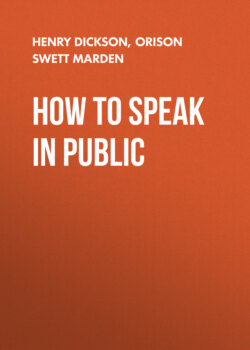Читать книгу HOW TO SPEAK IN PUBLIC - Henry Dickson - Страница 8
На сайте Литреса книга снята с продажи.
CHAPTER III.
Securing the Confidence of the Audience
ОглавлениеTable of Contents
THE BEGINNING
The first thing for the public speaker to do is to gain the confidence and sympathy of his audience. Under no circumstances is he to antagonize or prejudice his audience against him in the beginning. There are many methods available for public speakers by means of which his audience may be made suggestible and uncritical and accept almost any conclusion which is presented to them.
A favorite method is to begin by telling a humorous Story bearing upon the subject, or an apt quotation. Let the story be fairly well told and it will not fail to capture an audience. The introduction if rightly prepared and given will do much to win an audience at the very beginning and secure to the speaker sympathetic attention and confidence. A careful study of the following introductions, many of them taken from oratorical masterpieces, will reveal the practice of successful speakers.
There are some speakers who by their presence beget confidence, and others lack this power, and are never able to acquire it. The following introductions of some of the great orators reveal a studied attempt on the part of the speaker to win the confidence of his audience before the address is revealed.
William Jennings Bryan, in the following introduction to one of his most famous speeches, secures the confidence of his audience at the very beginning and dissipates all suspicion:
“I would be presumptuous, indeed, to present myself against the distinguished gentleman to whom you have listened if this were a mere measuring of abilities; but this is not a contest between persons. The humblest citizen in all the land, when clad in the armor of a righteous cause, is stronger than all the hosts of error. I come to you to speak in defense of a cause as holy as the cause of liberty—the cause of humanity.”
In like manner Mark Antony banished suspicion and secured the confidence of the Roman populace:
“I come not, friends, to steal away your hearts:
I am no orator, as Brutus is,
But, as you know me all, a plain, blunt man,
That love my friend; and that they know full well That gave me public leave to speak of him.
For I have neither wit, nor words, nor worth, Action, nor utterance, nor the power of speech,
To stir men’s blood: I only speak right on:
I tell you that, which you yourself do know,
Show you sweet Caesar’s wounds, poor, poor, dumb mouths
And bid them speak for me; but were I Brutus,” etc.
Daniel Webster’s deliberative oration, “In Reply to Hayne,” begins with this beautiful allusion: “When the mariner has been tossed for many days in thick weather and on an unknown sea, he naturally avails himself of the first pause in the storm, the earliest glance of the sun, to take his latitude and ascertain how far the elements have driven him from his true course.”
The orator then applies the illustration to the debate upon which he has entered.
Henry W. Grady began his great after-dinner oration on “The New South” by making a quotation:
“‘There was a South of slavery and secession—that South is dead. There is a South of union and freedom—that South, thank God, is living, breathing, growing every hour.’ These words, delivered from the immortal lips of Benjamin H. Hill, at Tammany Hall, in 1866, true then, and truer now, I shall make my text to-night.”
Judge Jeremiah S. Black prefaced his forensic oration on “The Right to Trial by Jury” with these words:
“May it please your Honors: I am not afraid that you will underrate the importance of this case. It concerns the rights of the whole people. Such questions have generally been settled by arms. But since the beginning of the world no battle has ever been lost or won upon which the liberties of a nation were so distinctly staked as they are upon the results of this argument. The pen that writes the judgment of the court will be mightier for good or for evil than any sword that ever was wielded by mortal man.”
A popular speaker has said: “Never show annoyance before an audience. Preachers have lost their pulpits, lawyers their cases, and lecturers their second invitation in consequence of speaking unadvisedly. ‘Little boy,’ said the preacher, ‘if you don’t stop see-sawing your head I’ll come down there and cut it off.’ He wished one minute after, and has wished all his life since, that he had allowed the youngster to see-saw to his head’s content. Better that the boy should kill the sermon than the preacher should kill himself. The teeth of one lecturer were set on edge by the interruptions of an inebriated hearer, and the audience applauded the lecturer. But the lecture not content with his victory, alluded again and still again to the interruption long after it had ceased, and the audience turned against the lecturer, who was finally hissed. Never put yourself in the wrong with an audience. It has every advantage of you. It has many heads to your one. Keep your audience on your side in every case of speaker vs. some one hearer. This is where the speaker needs self-restraint and tact.”
